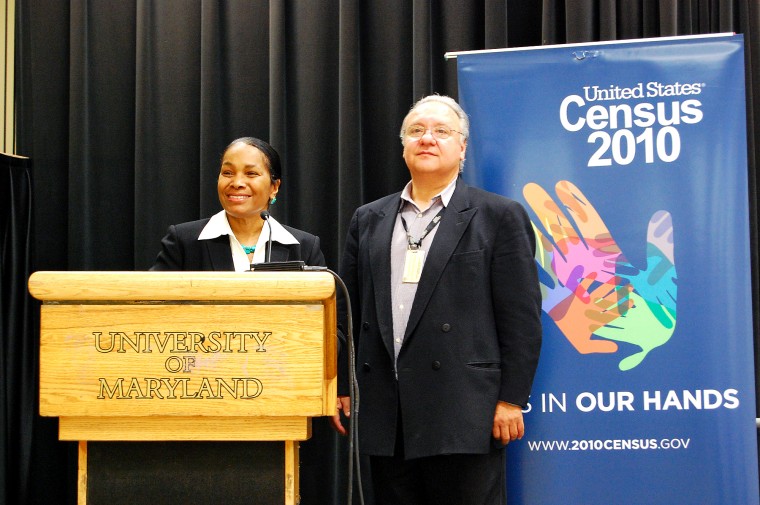
Dottie Chicquelo of the university’s Office of Multi-Ethnic Student Education and Alex Compagnet of the U.S. Census Bureau train student census volunteers Wednesday evening at the Nyumburu Cultural Center.
When the U.S. Census Bureau rolls through College Park every 10 years, many students slip through the cracks.
This year, census and university officials are taking steps to ensure that students get counted, so the region’s legislative districts can be properly defined and funding correctly allocated based on population.
“A lot of students don’t know, but answers from the census help allocate $400 billion of public funding to public institutions, such as hospitals and schools … and also determines congressional apportionment, based on how many people live in an area,” said Sammi Liang, a senior American studies and communication major.
As part of this effort, the U.S. Census Bureau teamed up with the university to hold student volunteer training events at the Nyumburu Cultural Center late last week.
Liang is a member of the Bateman Competition Team, a group of communication majors selected by that department’s faculty members to annually create a mass advertisement campaign. This year, the competition is focused on encouraging students to participate in the census.
The group met with the Student Government Association, advertised at tables outside grocery stores as well as the Stamp Student Union and encouraged College Park landlords to send out mass e-mails to inform students of the importance of filling out the census, Liang said, likening filling out the census to voting.
But while both can be seen as a student’s civic duty, unlike voting, it’s illegal to just skip the census. Title 13 of the United States Code requires everyone living in the United States to participate.
In March, every student with a household address, including apartments, will be mailed forms and should mail them back, said Rachel Camann, a spokeswoman for Weber Shandwick, a public relations firm representing the U.S. Census Bureau.
From April 1 through the end of May, students living in group quarters, such as dorms, will be counted by official census takers with assistance from university administrators, and the Office of Fraternity and Sorority Life will independently handle students in Greek houses.
Liang said regardless of the census being taken at the university, census forms for students would still be mailed to their permanent address, which parents have been known to fill out for their kids in previous censuses.
“I’m totally sure that happens,” she said. “That’s why we’re trying to clarify that parents shouldn’t fill out students’ forms. Obviously we can’t call every student’s house, so students need to be the ones to tell their parents.”
Students are among the groups most likely to neglect their census forms, Liang said.
Those who do not understand the purpose or function of the census are less likely to fill it out, she added. In the past, there has been confusion among various populations including renters and college students who are often transient and think the census is only for homeowners or those who live in an area for a long period of time.
But the census does not ask anything about citizenship and is merely concerned what the population of an area is at one particular moment, she added.
Census staff will be visiting college campuses throughout the rest of February and March in order to prepare the universities for the Group Quarters enumeration, Camann said.
The public relations campaign launched by the Bateman Team is over at the end of February, so after all the talks with different campus groups, tabling and dissemination of reading materials, Liang hopes students will remember to participate.
“If students don’t take the census there will be an inaccurate count,” she said. “We don’t want the government to waste money on sending census people out to our school and misappropriate funding or have inaccurate congressional districts.”
botelho@umdbk.com



